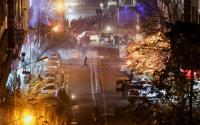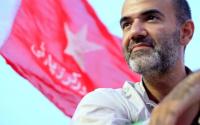On the streets of Baghdad yesterday, it was Kabul, November 2001, all over again. Then, enthusiasts for the war on terror were in triumphalist mood, as the Taliban regime was overthrown. The critics had been confounded, they insisted, kites were flying, music was playing again and women were throwing off their burkas. In parliament, Jack Straw mocked Labour MPs who predicted US and British forces would still be fighting in the country in six months' time.
Seventeen months later, such confidence looks grimly ironic. For most Afghans, "liberation" has meant the return of rival warlords, harsh repression, rampant lawlessness, widespread torture and Taliban-style policing of women. Meanwhile, guerrilla attacks are mounting on US troops - special forces soldiers have been killed in recent weeks, while 11 civilians died yesterday in an American air raid - and the likelihood of credible elections next year appears to be close to zero.
In Baghdad and Basra, perhaps the cheering crowds have been a bit thinner on the ground than Tony Blair and George Bush might have hoped - and the looters and lynchers more numerous. But it would be extraordinary if many Iraqis didn't feel relief or euphoria at the prospect of an end to a brutal government, 12 years of murderous sanctions and a merciless bombardment by the most powerful military machine in the world. Afghanistan is not of course Iraq, though it is a salutary lesson to those who believe the overthrow of recalcitrant regimes is the way to defeat anti-western terrorism. It would nevertheless be a mistake to confuse the current mood in Iraqi cities with enthusiasm for the foreign occupation now being imposed. Even Israel's invading troops were feted by south Lebanese Shi'ites in 1982 - only to be driven out by the Shi'ite Hizbullah resistance 18 years later.
Nor does the comparative ease with which US and British forces have bombed and blasted their way through Iraq in any way strengthen the case for their war of aggression, as some seem to have convinced themselves. Not even the smallest part of the anti-war argument rested on any illusion that a broken-backed third world regime could win a set-piece military confrontation with the most technologically advanced fighting force in history. Rather, the surprise has been the extent of the resistance and bravery of many fighters, who have confronted tanks with AK 47 rifles and died in their thousands.
In reality, the course of the conflict has strengthened the case against a war supposedly launched to rid Iraq of "weapons of mass destruction" - but which has now morphed into a crusade for regime change as evidence for the original pretext has so embarrassingly not materialised. Not only have US and British forces so far been unable to find the slightest evidence of Saddam Hussein's much-vaunted chemical or biological weapons. But the Iraqi regime's failure to use such weapons up to now, even at the point of its own destruction, suggests either that it doesn't possess any - at least in any usable form, as Robin Cook suggested - or that it has decided their use would be militarily ineffective and politically counter-productive.
So great is the political imperative to find such weapons, it seems hard to believe they won't turn up in some form. This is after all the coalition which used forged documents to implicate Iraq in the purchase of uranium for nuclear weapons from Niger. But, short of a last-ditch deployment in Tikrit or Mosul, the main pre-emptive pretext for war has already been exposed as a fraud.
As the price that Iraqis have had to pay in blood has become clearer - civilian deaths are already well into four figures - Tony Blair and his ministers have increasingly had to fall back on a specious moral calculus to justify their aggression, claiming that more innocents would have died if they had left the Iraqi regime in place.
What cannot now be disguised, as US marines swagger around the Iraqi capital swathing toppled statues of Saddam Hussein with the stars and stripes and declaring "we own Baghdad", is the crudely colonial nature of this enterprise. Any day now, the pro-Israeli retired US general Jay Garner is due to take over the running of Iraq, with plans to replace the Iraqi dinar with the dollar, parcel out contracts to US companies and set the free market parameters for the future "interim Iraqi administration".
Shashi Tharoor, UN under secretary-general warned Britain and the US against treating Iraq as "some sort of treasure chest to be divvied up", but the Pentagon, which is calling the shots, isn't listening. Its favoured Iraqi protege, Ahmed Chalabi - scion of the old Iraqi ruling class who last set foot in Baghdad 45 years ago - was flown into Nasiriya by the Americans at the weekend and, almost unbelievably for someone convicted of fraud and embezzlement, is being lined up as an adviser to the finance ministry.
Meanwhile, Tony Blair is once again seeking to provide a multilateral figleaf for a policy set by Washington hardliners. "Democratisation" in Iraq could only have legitimacy if security were handed over to a United Nations force of non- combatant troops and elections for a constituent assembly held under UN auspices. But nothing of the kind is going to happen, when even Colin Powell insists on "dominating control" by the US. The "vital" UN role Blair has secured from the US president appears to be no more than humanitarian aid and the right to suggest Iraqi names for the interim authority.
The most that could eventually be hoped for from US plans is a "managed" form of democracy in a US protectorate, with key economic and strategic decisions taken in advance by the occupiers. Given the likely result of genuinely free elections in any Arab country, it is little wonder that the US would have such problems accepting them - just as they collude with torture and dictatorship by their client states in the region. Anyone who imagines the US is gagging for independent media in the Middle East should ponder Tuesday's attacks on the al-Jazeera and Abu Dhabi TV offices in Baghdad.
The wider global impact of this war was spelled out by North Korea's foreign ministry this week. "The Iraqi war shows," it declared, with unerring logic, "that to allow disarmament through inspections does not help avert a war, but rather sparks it", concluding that "only a tremendous military deterrent force" can prevent attacks on states the US dislikes.
As the administration hawks circle round Syria and Iran, a powerful boost to nuclear proliferation and anti western terror attacks seems inevitable, offset only by the likelihood of a growing international mobilisation against the new messianic imperialism. The risk must now be that we will all pay bitterly for the reckless arrogance of the US and British governments.






